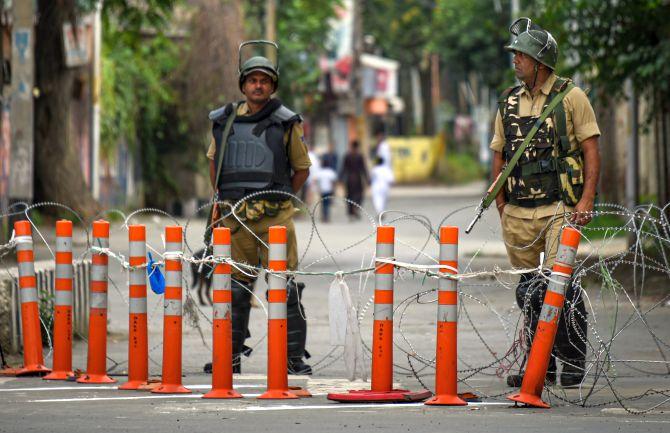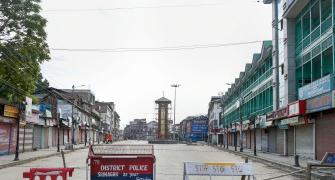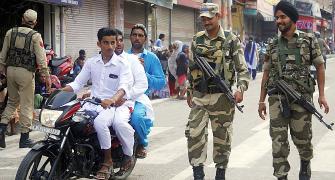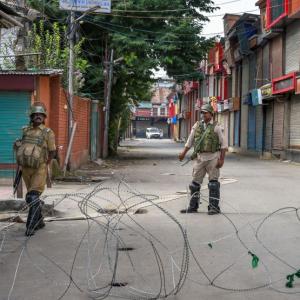A lot of the factors towards which the government has pointed to justify its moves on Jammu and Kashmir are in fact valid. Only, most of them have little to do with Article 370, says David Devadas.

There is no doubt that the Kashmir Valley has a very strong sense of separate history, culture, and identity.
Since at least 1930, this identity has been imagined in many Kashmiri minds as Muslim; I have called this the Kashmiri-as-Muslim identity in my book, The Story of Kashmir.
This is the nub of the issue. Sheikh Abdullah, the towering Kashmiri leader, demanded and obtained safeguards of separate identity for his state on the basis of this Kashmiri-as-Muslim identity.
Other sociological identities in the state were ignored -- or rather, taken for granted.
Ideology discounted
It is remarkable -- even welcome -- that an ideologically driven government’s spokespersons have not sharply focused on ideological reasons why Article 370 and Article 35A of the Constitution were removed.
They have, it is true, pressed the nationalist argument that Article 370 promoted a psychology of separateness among the Valley’s politicians and people. But they have shied away from the related, and very prickly, issue that a Muslim majority province was given that psychological reassurance in a Hindu-majority country.
Some might argue that, the way the world is changing, some citizens might want to cling to such reassurances more vigorously than in the past.
Sociological diversity
To this, the government’s spokespersons have pointed -- quite correctly -- to those other sociological identities in the state.
They have a point, only the same sort of trope of singular exclusivity lurk in their minds as has done in the minds of Kashmiri leaders from Abdullah on. They tend to reduce Ladakh to Ladakhi-as-Buddhist, and the variegated Jammu division to Jammu-as-Hindu identities.
Protests in Kargil make it obvious that the Shia Muslim identity group which dominates society there resents being cornered by the Ladakhi-as-Buddhist trope. Muslims, after all, constitute the majority of Ladakh’s population -- albeit a razor-thin majority.
Ladakh’s Muslims resented this packaging of Ladakh as `the land of lamas’ since the days of Nehru.
The Centre has gone out of its way over much of the past three decades to balance its approach to the region.
It is important to reinvigorate that balance now that Ladakh has become a Union territory.
Unconnected factors
A lot of the factors towards which the government has pointed to justify its moves on Jammu and Kashmir are in fact valid. Only, most of them have little to do with Article 370.
The first factor on which government spokespersons have harped on is that two or three families have dominated the politics of the state. This is true, irrespective of Article 370; and it could be said about some other notable states too.
Politicians could have changed -- and their issues and biases too -- but such changes ought to be organic, not dictated by State fiat.
Widespread corruption
The government has also argued that monies sent from the Centre have gone astray, and have not entirely been spent on the schemes for which they were sanctioned. Again, this is quite correct. Also again, this has little to do with Article 370.
In fact, the global corruption tracker, Transparency International, has repeatedly listed Jammu and Kashmir as the most corrupt state in the country since 2009. But, notwithstanding Article 370, the Centre’s various agencies mandated to prevent corruption and audit government accounts were free to function, and ought to have done so.
It is true that, under the terms of the New Delhi Agreement of 1952, the constitutional authority, the Comptroller and Auditor General of India, initially did not have jurisdiction over the state’s accounts. But that changed in 1958, since when the CAG has been permitted to audit the state’s accounts.
Empty shell
Indeed, in several ways, Article 370 had gradually been reduced to a shell of its original intent over the decades. There were very few national laws, regulations, and provisions that did not apply to the state before August 5.
Plus, central forces had a great deal of authority and elbow-room, thanks to the Armed Forces Special Powers Act (AFSPA), which has been in operation in J&K since 1991.
Most well-off
The argument that there is great poverty in the state, which will now be ended, does not hold water. Generally speaking, the Kashmir Valley is the most well-off part of the subcontinent, in terms of the flow of money.
This is an aspect of the widespread corruption, and the fact that every Central government since Nehru’s has thrown money at Kashmir -- perhaps in the mistaken hope that that would decrease public unrest.
Investment opportunities
Nor were there restrictions on investments in the state owing to Article 370, except that companies (and individuals) could not own freehold property, only lease property for up to 99 years -- extendable.
Indeed, the 2002 Industrial Policy for the state vouchsafed a dream package of subsidies and incentives from both the Centre and the state governments -- including low-interest loans, subsidies for power, power back-up, and transportation of products to the state’s border.
One reason there has nevertheless been almost no investment in Kashmir is the widespread corruption and bureaucratic obstacles. This is is a longstanding issue, and has little to do with any constitutional stipulation -- or lack thereof.
Unsettled conditions
Another major reason for lack of investment is that putative investors focus on the unsettled conditions in the Valley. Sadly, the legal changes may only make the place more unsettled.
Militants -- who are increasingly influenced by the pan-Islamism of Al Qaeda and Islamic State—do not focus on Indian law or constitutional arrangements. They tend to despise the entire system, including the very ideas of nationalism and democracy.
The argument that insurgency, militancy and terrorism have flourished in Kashmir as a result of Article 370 is stretched.
The related argument -- that Pakistan has been able to interfere in India’s internal affairs owing to the special provisions for the state -- is also misplaced. Pakistan would have done so in any case.
On the contrary, Pakistan has in certain phases been forced to adopt Sheikh Abdullah, who was struggling for `maximum autonomy’ from—in—India. It even warmed towards his son Farooq, and his grandson Omar Abdullah in some phases.
Pandits’ return
The argument that Pandits can now return to settle in the Kashmir Valley is odd, since there were no restrictions on their settling there even under Articles 370 and 35-A.
The only way that argument adds up is that Pandits might feel more secure about moving back along with substantial numbers of Hindus from other parts of the country. The recent legal changes have allowed that.
David Devadas is the author of The Story of Kashmir and The Generation of Rage.










